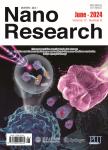External field-strengthened Ostwald nanowelding
作者机构:Hunan Key Laboratory of Two-Dimensional MaterialsAdvanced Catalytic Engineering Research Center of the Ministry of Educationand College of Chemistry and Chemical EngineeringHunan UniversityChangsha 410082China Nanophotonics Research CenterShenzhen Key Laboratory of Micro-Scale Optical Information Technology&Institute of Microscale OptoelectronicsShenzhen UniversityShenzhen 518060China State Key Laboratory for Physical Chemistry of Solid SurfacesXiamen UniversityXiamen 361005China
出 版 物:《Nano Research》 (纳米研究(英文版))
年 卷 期:2022年第15卷第5期
页 面:4525-4535页
核心收录:
学科分类:07[理学] 070205[理学-凝聚态物理] 08[工学] 080501[工学-材料物理与化学] 0805[工学-材料科学与工程(可授工学、理学学位)] 0702[理学-物理学]
基 金:This work was financially supported by the National Natural Science Foundation of China(Nos.21872047 21673070 and 91750205)lHunan Key Laboratory of Two-Dimensional Materials(No.2018TP1010)
主 题:external field(EF) Ostwald ripening(OR) nanowelding Au nanoparticle(NP) Ag nanowire(NWs)
摘 要:The accomplishment of nanowelding typically requires the input of high energy,possibly causing appreciable damages to the brittle ***,we report an external field(EF,i.e.,light,direct current(DC),and alternating current(AC))-strengthened Ostwald nanowelding(ONW)strategy to enable low-temperature nanowelding of Au nanoparticles(NPs)with nanoscale spacing in solution and propose an electron localization mechanism to understand *** reveal that the EF-derived local electrons not only greatly strengthen the dissolution of surface atoms and the reduction of Au3+ions dissolved,but also confine(together with ordered water molecules)the transport of Au^(3+)ions within the ***,the electrochemical Ostwald ripening(OR)process of the Au NPs is actively strengthened,which,along with the local electron-strengthened surface atom diffusion(as a result of the strong electrostatic repulsion created),enables feasible ONW for solution processing of interdigital electrodes(IDEs)from Au NPs and high-performance transparent conductor(TC)from Ag nanowires(NWs).Our low-temperature nanowelding strategy offers an efficient interconnection technique for the processing of functional nanodevices from individual nanomaterials.



